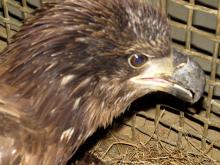Information Possibly Outdated
The information presented on this page was originally released on June 28, 2011. It may not be outdated, but please search our site for more current information. If you plan to quote or reference this information in a publication, please check with the Extension specialist or author before proceeding.
Teamwork helps save bald eagle
By Karen Templeton
MSU Ag Communications
MISSISSIPPI STATE – One of America’s fondest symbols, the bald eagle, could be flying high again after a concerned citizen and three organizations worked together to save its life.
A passerby noticed an injured bald eagle in the Burnsville community near County Road 306 and immediately sought help.
“The eagle was brought into the Alcorn County department of wildlife office by the gentleman who found him,” said Blake Palmer, conservation captain for the Mississippi Department of Wildlife Fisheries and Park’s Northern District. “The bird seemed to be really distressed and definitely couldn’t fly. All we knew for certain is that it needed help.”
Palmer and another officer transported the eagle to Mississippi State University’s College of Veterinary Medicine. Dr. Lori Haas, clinical sciences instructor, along with veterinary technician Maggie Horner, was ready and waiting at CVM’s Animal Health Center for the eagle to arrive.
“We did a quick physical and assessed his symptoms,” Haas said. “We were able to determine he was a juvenile bald eagle. Despite being young, he was large, with a five- to six-foot wing span.”
The eagle had a fractured wing from a pellet that was still lodged in his wing. He was dehydrated, starving and in shock.
Haas supervised as Horner and a team of CVM veterinary students evaluated and stabilized the eagle.
“His needs were assessed quickly. It was important that we got him fluids to control his hydration,” Horner said. “We kept him isolated from the other animals to keep him calm and to help relieve his shock and distress.”
After the eagle was stabilized, the team made calls to find where the eagle could get necessary treatment.
“CVM’s role is to evaluate and stabilize the wildlife patients we receive and then find them placement at a facility that provides surgical procedures to wildlife,” Haas said. “We are always able to find a suitable place where the animals can be treated and stay to recover. This time, we secured a spot at the Jackson Zoo for our patient.”
After six hours of treatment at CVM, two veterinary students transported the eagle to Jackson.
“The eagle was in good condition when he arrived at the zoo,” said Dr. Michael Holifield, contract veterinarian for the Jackson Zoo. “He was what we call BAR – bright, alert and responsive. He was just thin due to lack of food.”
Holifield and his team decided to operate to remove the pellet from the eagle’s wing. After multiple attempts, Holifield left the pellet because it was lodged in the wing in such a way that it could not be removed safely.
“The eagle’s wing is healing, and we’ve done an additional procedure to enhance his bone healing,” said Holifield, who owns All About Animals clinic in Crystal Springs with his wife, Dr. Becky Holifield, both of whom are MSU CVM graduates. “He’s doing well with the recovery process and is eating and drinking. The entire healing process just takes time.”
Holifield credits CVM with getting the eagle well enough for further treatment.
“The fact that CVM had already stabilized and hydrated the bird made our job a lot easier,” he said.
The Jackson Zoo is providing care to the eagle as he recovers. Their goal is to release him into the wild after proper rehabilitation.
“He can’t fly yet, but we are optimistic,” Holifield said.
Palmer is thankful for the concerned citizen who found the eagle. The quick response and well coordinated teamwork helped in the eagle’s healing process.
“We are still investigating how this happened to the eagle,” Palmer said. “A $2,500 reward is being offered for information leading to the arrest of the person who shot him.”
Bald eagles are protected under the Bald and Golden Eagle Protection Act and the Migratory Bird Treaty Act, both federal and state wildlife statutes. Anyone with information concerning this eagle is asked to call the Grenada Office of Law Enforcement with the U.S. Fish and Wildlife Service at (662) 227-0990 or the Mississippi Department of Wildlife, Fisheries and Parks at (800) 237-6278.
Contact: Dr. Lori Haas, (662) 325-3432



